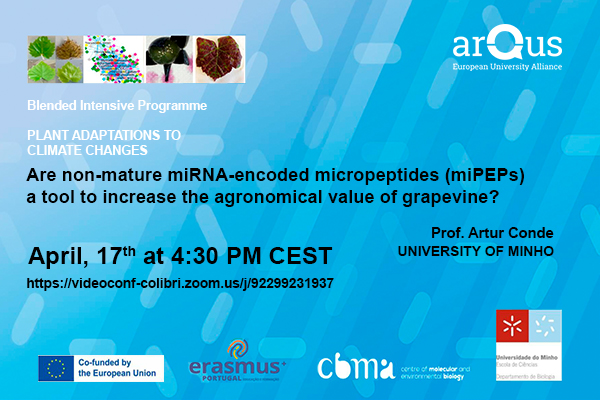
Arqus CChSD Webinar #5: “Are non-mature miRNA-encoded micropeptides (miPEPs) a tool to increase the agronomical value of grapevine?”

Type: Arqus Living Labs, Climate Change
Open to: Academics & researchers, Early Post-docs, PhD Students, Students
The Arqus Climate Change and Sustainable Development (CChSD) cluster invites researchers and students to participate in the webinar “Are non-mature miRNA-encoded micropeptides (miPEPs) a tool to increase the agronomical value of grapevine?”, which will take place on Wednesday, 17th April 2024, at 16:30 CEST.
Recent advancements in molecular biology have unveiled the functional significance of non-mature microRNA-encoded micropeptides (miPEPs) in plant development and stress response. These small peptides, translated from the sequences of non-mature miRNAs, have been implicated in the regulation of miRNA biogenesis and activity, presenting a novel layer of gene expression control.
This presentation discusses the agronomic potential of known microRNA-encoded micropeptides (miPEPs) in grapevine (Vitis vinifera L.), focusing on the examples of miPEP164c and miPEP166c. A potential role of these miPEPs in enhancing disease resistance in grapevine via miPEP-induced increase in secondary metabolites is speculated. This research underscores the potential of miPEPs as biotechnological tools for improving grapevine adaptation to adverse conditions, paving the way for their application in stress mitigation and viticulture enhancement strategies.
The session, led by Dr. Artur Conde from the University of Minho, is part of the Blended Intensive Programme on “Plant adaptations to climate changes” that is being organised by the Universities of Granada, Minho, Wroclaw and the Université Catholique de Louvain.